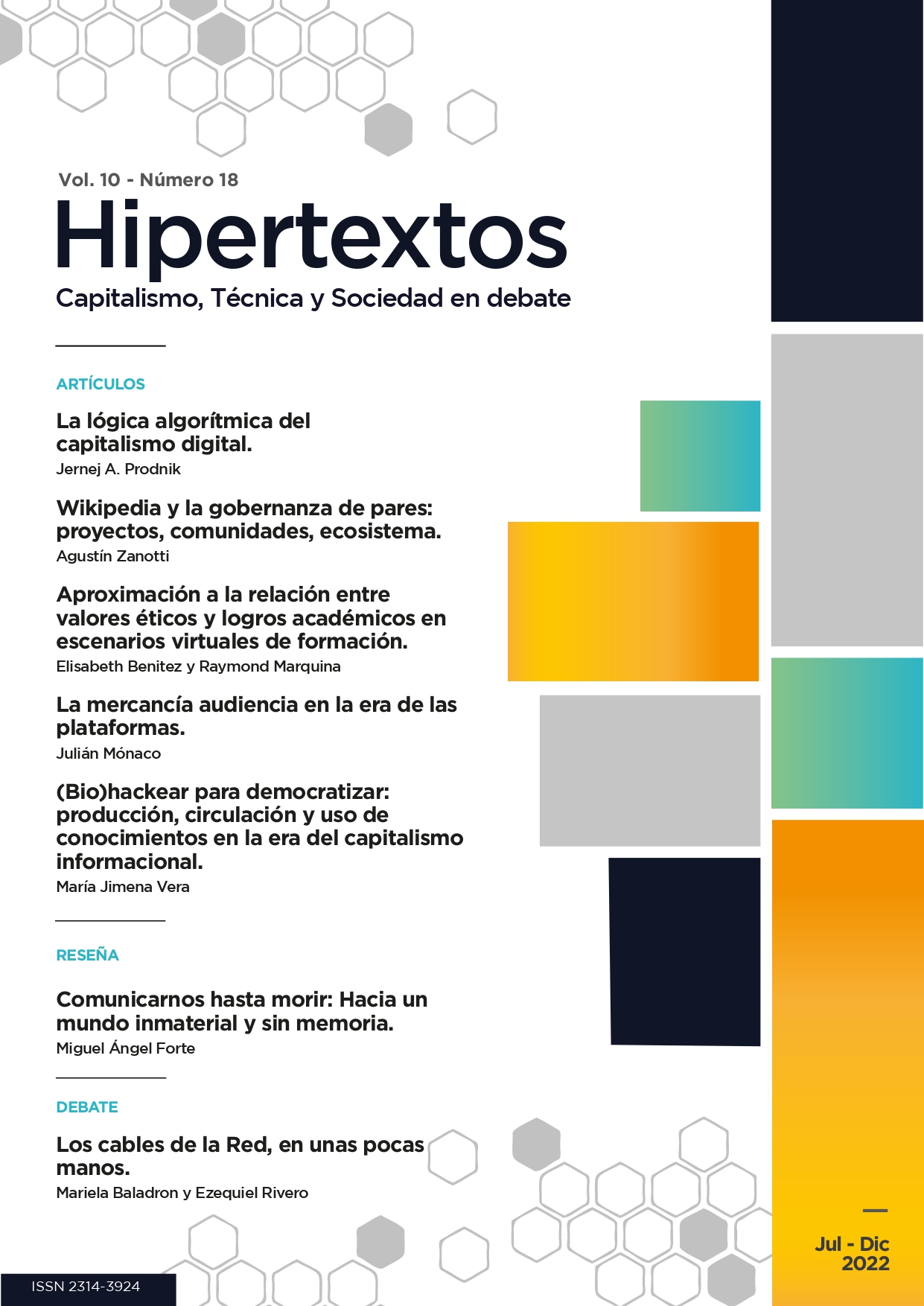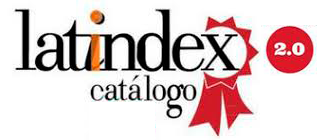A mercadoria do público na era das plataformas
DOI:
https://doi.org/10.24215/23143924e058Palavras-chave:
plataformas, big data, capitalismo cognitivo, personalização, audiênciasResumo
Entre as principais características do capitalismo contemporâneo está o fato de um conjunto de corporações de tecnologia e informação ocuparem as primeiras posições entre as empresas mais lucrativas do mundo. Em particular, Alphabet e Meta se destacam entre as big techs porque, apesar de seu grande porte e do grande número de projetos que desenvolvem, a maior parte de seus lucros vem da publicidade. É por isso que Nick Srnicek (2018) se refere a eles como casos paradigmáticos de plataformas publicitárias. Se as plataformas aparecem como “modelo(s) de negócios chave para extrair e controlar dados” (idem, p. 49), elas, em particular, as utilizam para vender espaço publicitário ultra-segmentado aos anunciantes.
Em 1977, Dallas Smythe (1983) escreveu que os estudos críticos tendem a pensar a comunicação a partir do conteúdo ideológico das mensagens e que esse tipo de perspectiva perde a questão —central para uma crítica da economia política da comunicação— pela função econômica da comunicação. os diferentes atores da indústria da consciência e, mais especificamente, pela forma de mercadoria que produzem. Sua ideia-chave é que, embora a mídia fabrique informação e entretenimento, ela o faz apenas como um passo intermediário na produção da principal mercadoria: audiências. O objetivo deste artigo é retornar a essa perspectiva agora no âmbito do capitalismo de plataforma: como empresas como Alphabet e Meta produzem mercadorias para o público? Em particular, estamos interessados em capturar como essas empresas contornam os limites que a mídia tradicional encontrou ao fabricar audiências no século 20. Qual é o papel do chamado “extrativismo de dados” (idem) aqui? Essa metáfora é inteiramente adequada para elaborar uma crítica da economia política das plataformas?
Downloads
Referências
Agamben, G. (2009). Signatura rerum. Sobre el método. Buenos Aires: Adriana Hidalgo.
Celis Bueno, C. (2019). Economía de la atención y visión maquínica: hacia una semiótica asignificante de la imagen. Hipertextos, 5(7), 41–55. https://revistas.unlp.edu.ar/hipertextos/article/view/7759
Costa, F. (2017). Omnes et singulatim en el nuevo orden informacional. Gubernamentalidad algorítmica y vigilancia genética. Poliética, 5 (1).
Costa, F. (2021). Tecnoceno. Buenos Aires: Taurus.
Couldry, N. y Mejías, U. (2019). Colonialismo de datos. Repensando la relación de los datos masivos con el sujeto contemporáneo. Virtualis, 10 (18).
Desjardins, J. (2017, 12 de mayo). Chart: Here’s How 5 Tech Giants Make Their Billions. Visual capitalist. www.visualcapitalist.com/chart-5-tech-giants-make-billions
Ewen, S. (1977). Captains of Consciousness: Advertising and the Social Roots of the Consumer Society. Nueva York, McGraw-Hill.
Fernández, R. (2022, 13 de octubre). La red social Facebook (Meta) en el mundo - Datos estadísticos. Statista. es.statista.com/temas/9060/la-red-social-facebook-en-el-mundo/
Fuchs, C. (2011). A Contribution to the Critique of the Political Economy of Google. Fast Capitalism, 8 (1).
Fuchs, C. (2012). Dallas Smythe Today: The audience commodity, the digital labour debate, Marxist political economy and critical theory. Prolegomena to a digital labour theory of value, En Marx and the Political Economy of the Media, Leiden, Brill.
Fumagalli, A., Lucarelli, S., Musolino E. y Rocchi, G. (2018). El trabajo (labour) digital en la economía de plataforma: el caso de Facebook. Hipertextos, 6 (9), 12–41. https://revistas.unlp.edu.ar/hipertextos/article/view/7644
Gendler, M. (2019). Personalización algorítmica y apropiación social de tecnologías. Desafíos y problemáticas. En A. L. Rivoir y M. J. Morales (Cords.), Tecnologías digitales: miradas críticas de la apropiación en América Latina. Buenos Aires, Clacso, Montevideo, RIAT.
Grassegger, H. y Krogerus, M. (2016, 3 de diciembre). Ich habe nur gezeigt, dass es die Bombe gibt. Das Magazin, 48.
Hardt, M. y Negri, A. (2004). Multitud. Buenos Aires: Debate.
Hardt, M. y Negri, A. (2011). Commonwealth. Madrid: Akal.
Harvey, D. (1998). La condición posmoderna. Investigación sobre los orígenes del cambio cultural. Buenos Aires: Amorrortu.
Kosinski, M., Stillwell, D. y Graepel, T. (2013, 9 de abril). Private traits and attributes are predictable from digital records of human behavior. Proceedings of the National Academy of Sciences, 110 (15), 5.802-5.805.
Lazarsfeld, P.F. (1968). Memoria de un episodio en la historia de la investigación social. REIS, 1 (96), 235-296.
Lazzarato, M. y Negri, A. (2001). Trabajo inmaterial. Formas de vida y producción de subjetividad. Río de Janeiro: DP&A.
Mattelart, A. (2000). La comunicación-mundo. Historia de las ideas y de las estrategias. Madrid: Fundesco.
Mattelart, A. (2007). La invención de la comunicación. Buenos Aires: Siglo Veintiuno Editores.
Mayer-Schönberger, V. y Cukier, K. (2013). Big data. La revolución de los datos masivos. Madrid: Turner Noema.
Matz, S., Stillwell, D., de Gedeón, N. y Kosinski, M. (2017, 17 de octubre). Psychological targeting as an effective approach to digital mass persuasion. Proceedings of the National Academy of Sciences.
Míguez, P. (2020). Trabajo y valor en el capitalismo contemporáneo. Reflexiones sobre la valorización del conocimiento. General Sarmiento: Ediciones UNGS.
Mónaco, J. (2022). El gobierno de los públicos en la era de los big data: pistas a partir del caso Kosinski. Intersecciones en Comunicación, 1 (16). https://doi.org/10.51385/ic.v1i16.145
Mónaco, J. y Mazzuchini, S. (2021). Una mirada foucaultiana a la Mass Communication Research. Questión, 3 (70). https://doi.org/10.24215/16696581e622
Negri, A. y Revel, J. (2017). “Inventar el común”, en Lobo Suelto! [blog]. Última fecha de consulta: 22-3-2022. https://lobosuelto.com/inventar-el-comun
Pasquinelli, M. (2009). Google's PageRank algorithm: a diagram of the cognitive capitalism and the rentier of the commun intellect. En K. Becker y F. Stalder (Comps.), Deep Search: The Politics of Search Beyond Google. Londres: Transaction Publishers.
Rullani, E. (2004). El capitalismo cognitivo, ¿un deja-vú?. En Y. Moulier Bontag et al, Capitalismo cognitivo, propiedad intelectual y creación colectiva. Madrid: Traficantes de sueños.
Smythe, D. (1983). Las comunicaciones: agujero negro del marxismo occidental. En G. Richeri (Comp.), La televisión: entre servicio público y negocio. Barcelona: Gustavo Gili.
Srnicek, N. (2018). Capitalismo de plataformas. Buenos Aires: Caja Negra.
Stachl, C., Au, Q., Schoedel, R., Gosling, S. D., Harari, G. M., Buschek, D., Theres Völkel, S., Schuwerk, T., Oldemeier, M., Ullmann, T., Hussmann H., Bischl, B. y Bühner, M.(2020). Predicting personality from patterns of behavior collected with smartphones. Proceedings of the National Academy of Sciences, 117 (30), 17680-17687. https://doi.org/10.1073/pnas.1920484117
Terranova, T. (2000). Free Labor: Producing Culture for the Digital Economy. Social Text, 18 (2), 35-58.
Terranova, T. (2017). Red stack attack! Algoritmos, capital y la automatización del común. En A. Avanessian y M. Reis (Comps.), Aceleracionismo. Estrategias para una transición hacia el poscapitalismo (pp. 91-109). Buenos Aires: Caja Negra.
Toffler, A. (1980). La tercera ola. Bogotá: Plaza & Janes.
Van Dijck, J., Poell, T. y De Waal, M. (2018). The Platform Society. Public Values in a Connective World. Nueva York: Oxford University Press.
Vercellone, C. (2009). Crisis de la ley del valor y devenir renta de la ganancia. Apuntes sobre la crisis sistémica del capitalismo cognitivo. En A. Fumagalli et al., La gran crisis de la economía global. Madrid: Traficantes de sueños.
Vercellone, C. (2013). Capitalismo cognitivo. Releer la economía del conocimiento desde el antagonismo capital-trabajo. Tesis, 11.
Virno, P. (2003). Gramática de la multitud. Para un análisis de las formas de vida contemporáneas. Madrid: Traficantes de sueños.
Youyou, W., Kosinski, M. y Stillwell, D. (2015). Computer-based personality judgments are more accurate than those made by humans. Proceedings of the National Academy of Sciences, 112 (4), 1036-1040. https://doi.org/10.1073/pnas.1418680112
Zuboff, S. (2020). La era del capitalismo de la vigilancia, Barcelona, Paidós.
Zukerfeld, M. (2014). Todo lo que usted quiso saber sobre Internet pero nunca se atrevió a googlear. Hipertextos, 2 (1), 64-103.
Downloads
Publicado
Como Citar
Edição
Seção
Licença

Este trabalho está licenciado sob uma licença Creative Commons Attribution-NonCommercial-NoDerivatives 4.0 International License.

























